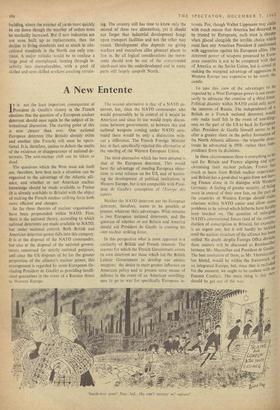A New Entente
(T is not the least important consequence of President de Gaulle's victory in the French elections that the question of a European nuclear deterrent should once again be the subject of in- ternational discussion. The starting point of this is now clearer than ever. One national European deterrent (the British) already exists and another (the French) will soon be opera- tional. It is, therefore, useless to debate the merits of the existence or disappearance of national de- terrents. The non-nuclear club can be taken as dead.
The questions which the West must ask itself are, therefore, how best such a situation can be organised to the advantage of the Atlantic alli- ance, and whether or not American nuclear knowledge should be made available to France (it is already available to Britain) with the object of making the French nuclear striking force both more efficient and cheaper.
So far three theories of nuclear organisation have been propounded within NATO. First, there is the national theory, according to which national deterrents are made available to NATO, but under national control. Both British and American deterrent power falls into this category. It is at the disposal of the NATO commander, but also at the disposal of the national govern- ments concerned for strictly national purposes, and since the US disposes of by far the greater proportion of the alliance's nuclear power, this arrangement is regarded by some Europeans (in- cluding President de Gaulle) as providing insuffi- cient guarantees in the event of a Russian threat to 'Western Europe. The second alternative is that of a NATO de- terrent, but, since the NATO commander who would presumably be in control of it would be American and since its use would imply discus- sions between governments, as between this and national weapons coming under NATO com- mand there would be only a distinction with- out a difference. The French Foreign Minister has, in fact, specifically rejected this alternative at the meeting of the Western European Union.
The third alternative which has been debated is that of the European deterrent. This would have the advantage of meeting European objec- tions to total reliance on the US, and of hasten- ing the development of political institutions in Western Europe, but is not compatible with Presi- dent de Gaulle's conception of l'Europe der patries.
Neither the NATO deterrent nor the European deterrent, therefore, seems to be possible at present, whatever their advantages. What remains is two European national deterrents, and the question of whether or not Britain and America should aid President de Gaulle in creating his own nuclear striking force.
In this perspective what is most apparent is a similarity of British and French interests. The reasons for which the French Government covets its own deterrent are those which led the British Labour Government to develop our atomic weapons: the desire to exert greater influence on American policy and to possess some means of defence in the event of an American unwilling- ness to go to war for specifically European in- terests. For, though Walter Lippmann may claim with much reason that America has deserved to be trusted by Europeans, such trust is slender when placed alongside the terrible choice which must face any American President if confronted with aggression against his European allies. The deterrent power of weapons possessed by Euro- pean countries is not to be compared with that of America or the Soviet Union, but is aimed at making the marginal advantage of aggression in Western Europe too expensive to be worth the candle.
To take this view of the advantages to be expected by a West European power is not neces- sarily to advocate the creation of a third force. Political disunity within NATO could only serve the interests of Russia. The independence of a British or a French national deterrent Would only make itself felt in the event of unwilling- ness on the part of the US to back its European allies. President de Gaulle himself seems to be after a greater share in the policy formation of the North Atlantic alliance—the tripartite direc- torate he advocated in 1958—rather than inde- pendence from its decisions.
In these circumstances there is everything to be said for Britain and France aligning and sYn' chronising their nuclear policies. France 11.,$ much to learn from British nuclear experience, and Britain has a good deal to gain from not leav- ing France alone in its dialogue with Western Germany. A feeling of greater security, of being more in control of their own fate, on the part of the countries of Western Europe should make relations within NATO easier and allow, some' problems to be solved which hitherto have barn!' been touched on. The question of enlarging NATO's conventional forces (and of the reintro duction of conscription in Britain), for example, is an urgent one. but it will hardly be tackled until the nuclear structure of the alliance has been settled. No doubt, despite Foreign Office denials' these matters will be discussed at Rambouillet between Mr. Macmillan and President de Gaulle. The best resolution of them, as Mr. Thorneycroft . has hinted, would be within the framework of an integrated Europe, but, since that is excluded' for the moment, we ought to be content with an Entente Cordia!,-... The main thing is that they should be got out of the way.
'Smokeless zone? Nay, lad, tha can't tamper wi' nature!'






































 Previous page
Previous page